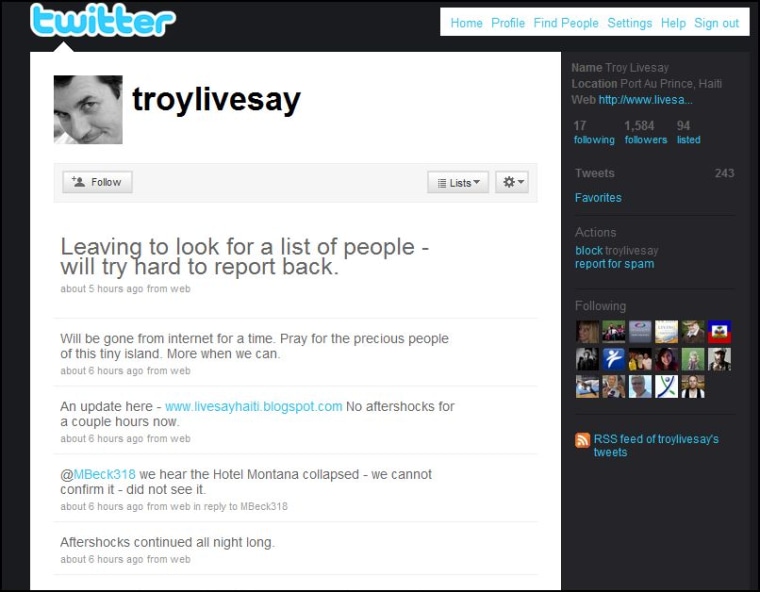In the aftermath of the Haitian earthquake, Twitter again is playing a key role in providing communications and news, as are other social networking sites, cementing their role as information providers during a time of crisis.
Twitter, a micro-messaging blog that limits posts to 140 characters, has been dominated by news from and about Haiti in the past 24 hours. It's a replay of what happened last June during the violence following Iran's presidential election, when communication was virtually shut down and protestors took to Twitter and Facebook to let the world know what was happening.
"We've been tweeting and reading all the tweets that have to do with the earthquake," said Wendy Harman, social media manager for the American Red Cross. "Getting information out and into Haiti is a challenge, but the outpouring of people wanting to help has been extremely heartwarming."
Harman said the Red Cross has used Twitter "in every major disaster and many smaller ones" since 2007, starting with the California wildfires.
Among those tweeting from Port-au-Prince is a resident who identifies himself as Troy Livesay, who is also blogging about the devastation. Livesay, who works with Christian ministries in Haiti, says he has lived there since 2006.
His Wednesday tweets included these comments: "Leaving to look for a list of people — will try hard to report back," "Church groups are singing throughout the city all through the night in prayer. It is a beautiful sound in the middle of a horrible tragedy" and "St. Joseph's home for boys is demolished but the boys got out safely."
Another man from Haiti, Frederic Dupoux, posted these tweets: "dead bodies are everywhere i havent seen one ambulance or any proffesionl (sic) med care anywhere in port-au-prince," "every other house is on the ground. people are terrified and have no hope" and "everybody is camping in the streets of port-au-prince sleeping under the stars to wake up from an awful nightmare."
Wyclef Jean, a member of the now-defunct Fugees musical group, is among the most well-known Haitians tweeting for help. He has been urging people to help by donating $5 to the Yele charity, and send a phone text-message to 501501 to contribute. The response appears to be overwhelming the charity's Web site, according to Yele.
On Twitter's own blog, co-founder Biz Stone said that "the atmosphere at Twitter HQ is heavy today and based on the Trending Topics (those that are most popular), an overwhelming number of Twitter users feel the same."
Flickr, a photo-sharing Web site, has also become a main venue for photographs from Haiti. Facebook, the world's largest social networking site with more than 350 million users, is also being heavily used.
Skype has also proven to be a key tool for phone communications. The service uses what's known as Voice over Internet Protocol (VoIP) technology, so that telephone calls can be made using a broadband Internet connection instead of a regular phone line.
With many services down in Haiti, broadband service is available through satellites.
"There's no phone service inside Haiti, except we have been able to talk via Skype with an intermittent connection," said Harman of the American Red Cross.
Meanwhile, Jeff W. Young of Akami Technologies, which measures Internet usage, said that "traffic to news sites is about 14 percent above normal for what the average is usually at this time period. This heightened traffic is no doubt associated with interest in the Haitian earthquake."
